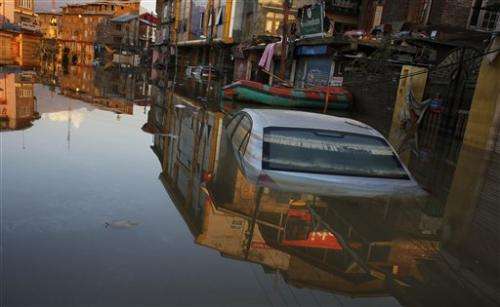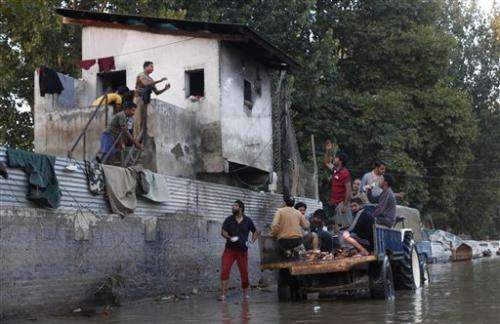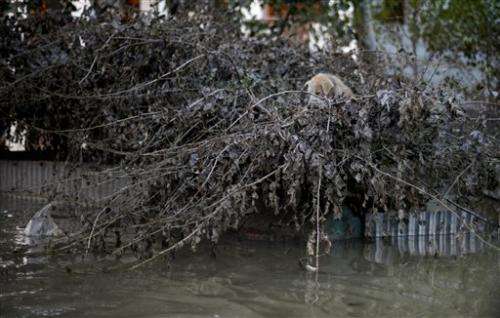Dirty water raising health risk in flooded Kashmir

The floodwaters are finally receding in much of Kashmir, but health experts worry a crisis could be looming with countless bloated livestock floating across the waterlogged region and hundreds of thousands of people living in temporary shelters.
Doctors were already seeing cases of diarrhea, skin allergies and fungus and were worried the stagnant waters would create conditions for serious disease outbreaks.
"The chance of cholera, jaundice and leptospirosis spreading are high," said Dr. Swati Jha with the aid group Americares. "The most essential need right now is that of clean water."
The scale of the disaster—described as an "unprecedented catastrophe" by the region's top elected official—has stunned many in India, with newspapers running daily front-page aerial photos showing isolated rooftops framed by mud-brown waters.
The Himalayan region of Kashmir is divided between India and Pakistan, while being claimed by both. And both sides have seen extreme devastation.
In Indian Kashmir, more than 200 people were killed and another 275,000 were evacuated after homes, shops and other buildings across the region filled to their rooftops almost two weeks ago.
On the Pakistani side, at least 328 people have died and 276,681 have been evacuated, with the floods affecting more than 3,000 villages extending beyond Pakistani Kashmir into the country's Punjab region.
Pakistani doctors have so far treated 123,020 patients in flood-hit areas, according to the country's National Disaster Management authority.
Indian rescue workers were rushing in health workers, sewage pumps, water filters, water purifying tablets and 30 generators to electrify relief camps and field hospitals. Six medical camps and 80 medical teams have already treated around 53,000 patients, according to the army, which has 30,000 additional troops on the ground for rescue and relief efforts.

But doctors on the ground said the need was vast—and urgent—though they said the cooler mountain temperatures were helping to slow any disease spread.
"There are pretty high chances of water-borne disease and disease due to over-crowding," said critical care specialist Dr. Javaid Naqishbandi in Srinagar, urging the government to send vaccines and avoid crowding people into shelters.
Warned by experts to avoid the muddy floodwaters, many residents are rationing the water bottles brought by aid workers every few days.
Rescue workers were wearing masks to avoid disease contamination. Local aid worker Fayaz Hamed said that, upon arriving in one submerged neighborhood of Srinagar on Monday night, the air was filled with the smell of rotting flesh.
"It was an overpowering stench, and we saw local residents pulling two bodies (of people) out of the water," Hamed said.
India's health minister, Harsh Vardhan, said a "large number" of doctors from Delhi government hospitals had gone to the region.
"I can't muster enough words in their praise," he said in a statement, pledging to send even more medicine, health workers and tools for filtering and cleaning water. He also urged local authorities to clear animal carcases and monitor water supplies.

In another area of Srinagar where the Indian army normally runs a dairy farm with more than 300 cows, only seven survived, while the rest were enormously bloated and floating in the floodwaters.
Even dry areas have been affected by the disaster. With everyday municipal services shut down, garbage was piling up on lands spared from the flooding, and residents were starting to burn it in huge bonfires that blacked out the sky.
At least 80 percent of the main city of Srinagar remained under more than 3-4 meters (9-12 feet) of water on Tuesday, with most residents now staying in shelters or with relatives on higher ground. As the water has begun to recede, emergency workers also have started pumping out standing water. But removing the water and debris fully will take months.
With cellphone services restored only in recent days, many were frantically trying to reach relatives and loved ones who have not been heard from.
"After the floods, the second disaster came when telecommunications broke down," creating a state of chaos for residents as they tried to find out where there was safety and how to get there, said local school teacher Reyaz Qazi, who was continuously dialing two telephones on Tuesday in hopes of reaching any of his 10 relatives and friends that were missing.
Indian Prime Minister Narendra Modi has asked the nation to skip celebrations for his birthday Wednesday, and instead focus on helping Kashmir recover from the floods.
"My humble request—do not celebrate my birthday. Instead, dedicate yourselves towards relief work in Jammu and Kashmir through your time and resources," Modi said Sunday on Twitter.
© 2014 The Associated Press. All rights reserved.



















